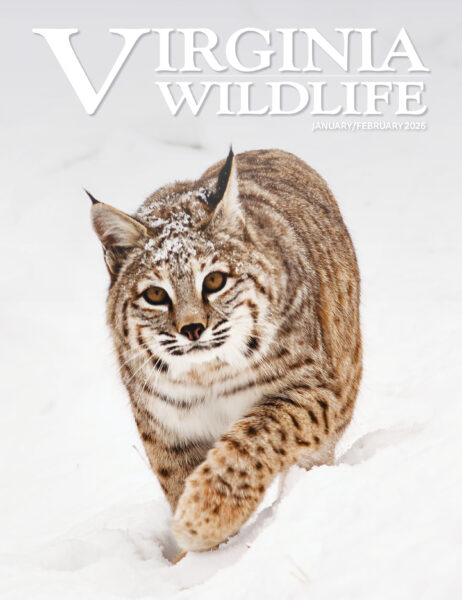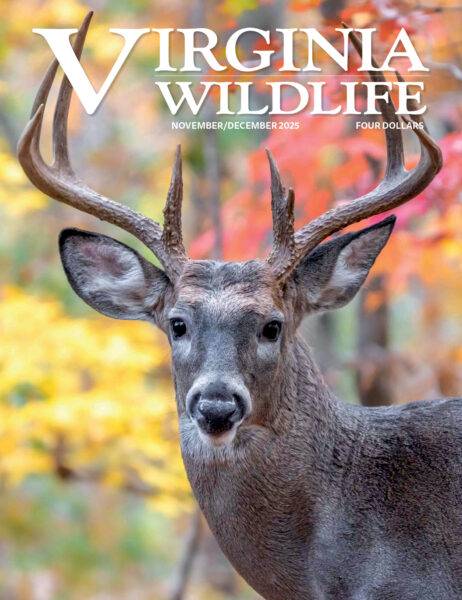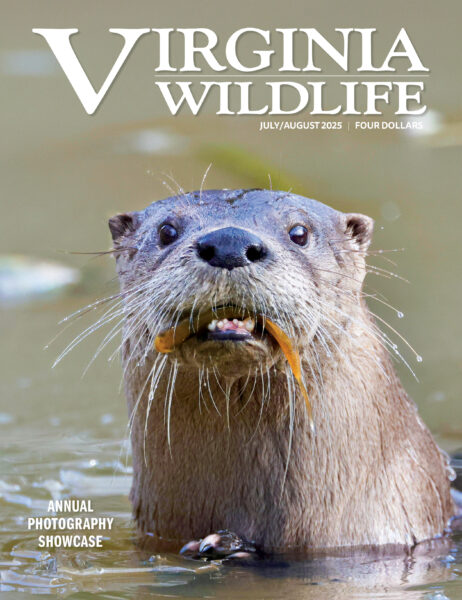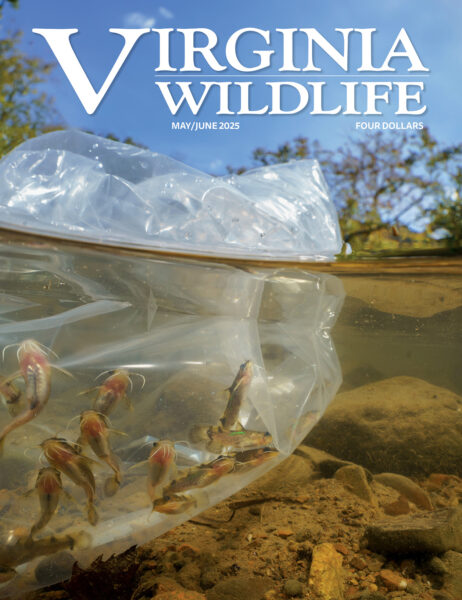For some novice hunters, a DWR mentor can provide wisdom and confidence for a day in the field.
By Molly Kirk/DWR
We call them “adult-onset hunters.” They’re people who may not have grown up with hunting as an activity they enjoyed with their family or friends, but as an adult, they’re interested in learning more about hunting. They come with a variety of motivations—spending time in the outdoors, sourcing a sustainable source of meat, participating in wildlife conservation, or tackling a new challenge. But they come eager to learn. The Virginia Department of Wildlife Resources (DWR) pairs these novice hunters with experienced hunters through their Hunting Mentor Program. The Mentor Program offers novice hunters a way to not only gain the skills and knowledge needed to have a successful day in the field, but also an opportunity to understand hunting and its role in wildlife conservation.
We spoke with three novice hunters who have hunted through the DWR Mentor Program and asked them to share their experiences in their own words:
Tyler Clark
Tyler Clark didn’t grow up hunting or have family that hunted, so when he became interested in hunting as an adult, he wasn’t sure how to get started. With the help of an experienced hunter mentor through the DWR mentor program, he harvested a spike buck in the last week of his first season of deer hunting.

Tyler Clark and his first deer harvest.
My wife and I are both in the healthcare field and are very health conscious. My interest really came from a holistic standpoint of, where are we finding our food? I thought maybe I could harvest animals from the wild. As somebody who’d never hunted before, I didn’t even know where to start. Not only did I have to get a firearm—that’s its own learning curve—but then I had to become a woodsman and understand the regulations side of things, and figure out where you can go and where you can’t go.
We went out for two days, and one of those days, I got really lucky. This little spike buck came creeping up over the ridge. He was maybe 90 yards out. He turned broadside for a little bit and I got lucky. Then we went through the whole processing aspect of it, and we’ve been eating the venison. It’s flavorful and good.
Prior to going through it, I would have said the shooting was the biggest challenge for learning to hunt, which actually, now, I think is relatively straightforward. What I learned is that the biggest thing is just spending time in the woods. There’s just so much that you can learn about the animals.
There’s so much that I still don’t know. When we’re out in the woods, my mentor will say, ‘Look at that bird. Look at these tracks. Look at this.’ There’s so much you can learn about being a woodsman, which I think goes a long way to developing your skills as a hunter. So much of it is not the actual hunting piece, which is just sitting there waiting for an animal to come by. But it’s all the other groundwork that gets laid prior to the season—spending time in the woods, interacting with that environment, and understanding the ecosystem.
I really enjoyed learning about how supportive the hunting community is and how giving of their time people are. I’ve noticed that even in the DWR workshops, whether it’s a processing class or shooting class, there’s such a community aspect to the hunting world, which was something I hadn’t been a part of before. There are hobbies you get into that can be standoffish to newcomers, but that’s not what I’ve experienced at all. People are so friendly and helpful, which has been one of the coolest parts about the experience.
I definitely cut my learning curve in half by being part of the mentor program. I probably would have eventually figured something out, but it would have taken a lot longer. It’s nice to have somebody be a sounding board and tell you, ‘This is what you need to do.’ Having somebody who can walk you through the process and then actually be in the woods with you is so valuable. My DWR mentor devoted a ton of time to that with me, which I’ve been super thankful for. It’s an awesome program; I can’t recommend it enough. If you want to get into hunting, this is the way to do it. It’s nice that Virginia has a set of resources for this.
I came into hunting from a food quality standpoint, but as I’ve engaged with it, I’ve enjoyed learning how you can be a steward for the environment and nature and how much Virginia has to offer. I was born and raised here, but it’s given me a more intimate relationship with our surroundings and our food.
Shanelle Thomas
Shanelle Thomas doesn’t come from a hunting background, and she lives in an urban environment, so hunting didn’t seem accessible to her. But getting connected with a DWR mentor helped her experience hunting. She hunted through a deer season and a spring turkey season without a harvest, but she’s eager to keep hunting.

Shanelle Thomas ready for a day of hunting.
I do other outdoor activities. I fish, I garden, things of that nature. And so naturally, I just wanted to try my hand at hunting as well. I was looking to add a new skill, a new source of sustainability. The few people that I did know who hunted would say, ‘Sure, I’ll take you,’ but then never really connect with anything concrete. And it was not anything that I was confident enough to try to tackle on my own. So once I received that email from a DWR mentor, I felt like that was my opportunity.
My mentor was also mentoring another novice hunter. To get us started, we had an initial meeting where we met each other and figured out what we were interested in, and talked about schedules. Our mentor helped us figure out what supplies we needed, what type of firearms, what type of ammo, helping us create a concrete game plan.
The time that he took to explain everything and the patience that he had made it less intimidating. He checked in and followed up with us through text messages. He took us to a range to shoot, and the other woman and I met up a few times to practice shooting. He took us scouting, kind of figuring out locations where we could set up when that time came. He showed us what signs to look for to let you know that there were deer in the area, the different scrapes and rubs and all of that stuff. So, the process of getting started wasn’t intimidating at all, because he made it very simple and approachable.
Unfortunately, I didn’t harvest a deer or a turkey, but the experience of getting those nerves out and knowing what to expect and to be prepared for was great. Some of the other DWR workshops that I attended also helped. I really enjoyed learning a new skill, being able to realize that it’s a game of patience and just stepping back and learning the process. Starting something new is not always the easiest thing. It was good to learn realistic expectations and know that there are people who have gone out year after year before actually getting a harvest.
I was shocked at how much peace I had just sitting out in the woods. You think being in the woods can be a scary thing, but that fear wasn’t really there. It was more of a calming experience.
I am looking forward to the new season. The good thing is, our mentor is willing to continue to work with us and help us. He mentored a young man previously, and from time to time they still go out together. It’s so valuable to be able to make that connection. Even if I decide to tackle it by myself, I know that I have a lifeline in case I need that extra support.
Nick Cecchi
Nick Cecchi grew up in Southern California and had always been interested in hunting, but never found an avenue to start. When he moved to Virginia, he discovered DWR’s mentor program and signed up. His second hunt, on a quota hunt at Merrimac Wildlife Management Area, was successful and he harvested a buck.

Nick Cecchi and his buck.
At the beginning of the program, I had said that I wasn’t even really interested in deer hunting because I thought it was so far beyond what I could learn in a season. I couldn’t be happier, knowing that hunting is now totally within my reach thanks to the mentor program. I was super excited to be learning information and skills that I’ve been trying to get my hands on for the last two decades. I did a good amount of reading books and watching TV and videos, but you really do need that hands-on experience of getting out there and doing it to really understand it all. I remember thinking, what am I even watching on YouTube? What does that look like when I’m doing it right?
I had been shooting since I was a teenager, so that learning curve, at least, wasn’t as steep. But getting up in a tree stand was something totally new! My mentor and I met once when he showed me how to use a tree stand, and we reviewed what buck shot I would be buying and a few other things.
Getting my first buck was awesome. Now, I 100 percent feel like I have the confidence that I can do this—it can actually be a hobby for me and not just a dream or an interest. Someone was willing to give their time to help me unlock a whole new hobby. My mentor didn’t just hold my hand. He said, here’s the tree stand. I’m going to show you how to use it, I’m going to show you how it’s all done, and then you’re going to do it, and I’m going to go over here and try to hunt deer myself. I think that gave me confidence. Him saying, ‘I believe you can do this and figure it out,’ really helped me be able to stay calm and tell myself, ‘I can do this.’
I feel more educated about safety and skills. I think DWR does an amazing job at making information really easily accessible online, but I feel much more confident about being on that public land now. I might not have all the skills for specific species, but at least now I know where to go to get started online and what land I can access.
The thing that I would say is that DWR usually has opportunities for hunters to learn, from the experienced hunter who simply just needs to learn about hunting in Virginia, all the way through helping people who have never held a firearm before. It seems like the different workshops and mentor program are good resources to get people more involved in hunting. I’m super grateful for that.
Learn more about DWR’s Hunting Mentor Program.
Molly Kirk is the DWR creative content manager.

This article originally appeared in Virginia Wildlife Magazine.
For more information-packed articles and award-winning images, subscribe today!
Learn More & Subscribe







